Fortress Old Ladoga
17 photo with description22.05.2019 11:12
22.05.2019 11:12
Andrey Panevin

In the Leningrad region, not far from the city of Volkhov, there is the first capital of Russia - Staraya Ladoga, and in it, a well-preserved fortress.
The first mention of the fortress dates back to 862 in the Tale of Bygone Years, referring to Prince Rurik’s vocation with Ladies Sineus and Truvor in Ladoga, she points to the construction of a wooden fortress by them.
At the end of the 9th and the beginning of the 10th centuries, the fortress was rebuilt in stone by the Prophetic Oleg.
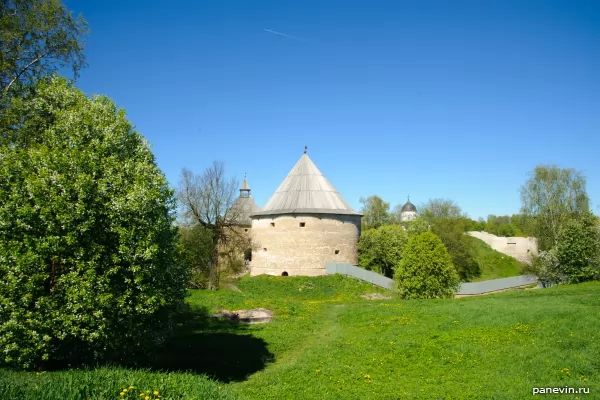
The fortress of Staraya Ladoga, in the foreground - the Clement's Tower, behind it on the left - the Gate Tower.
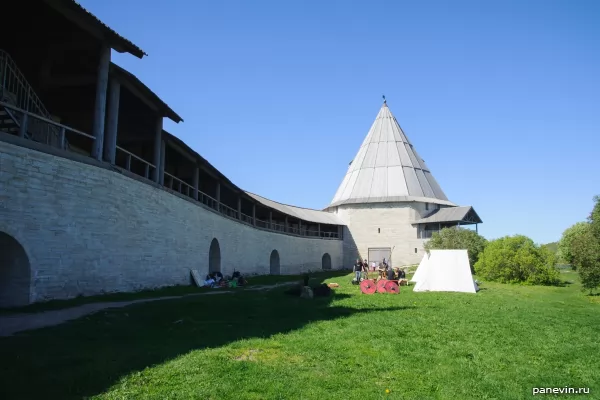
The arrow tower (corner) is a three-tiered tower located on the "arrow" - the confluence of the Elena River (Ladoga) and Volkhov.
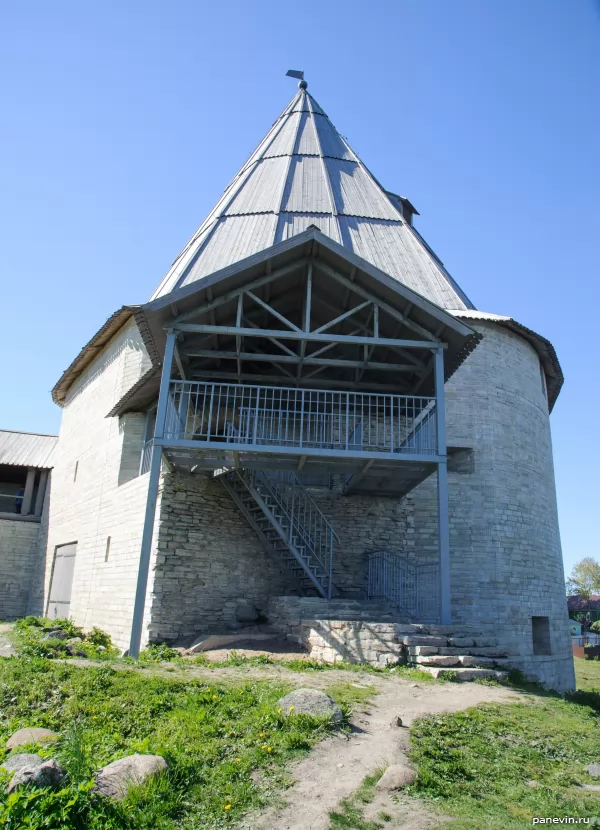
The switch tower can be climbed and walked along the fortress wall.
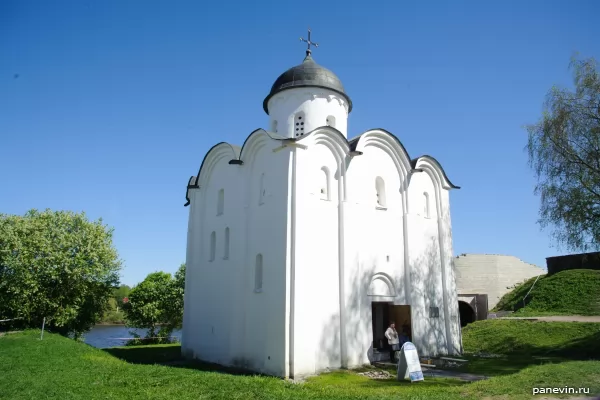
Church of St. George (XII century).
According to legend in 1164, Ladoga withstood the siege of the Swedes, and then calling for help Novgorod, Ladoga drove the enemy and at the mouth of the river Voronegi completely defeated him. In honor of this victory, the Church of St. George the Victorious was raised.
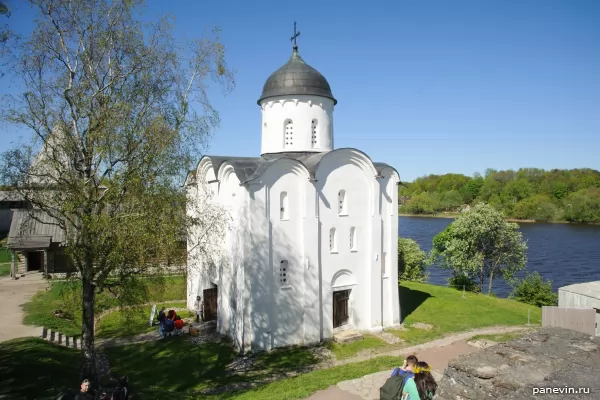
View of the Church of St. George from the fortress wall.
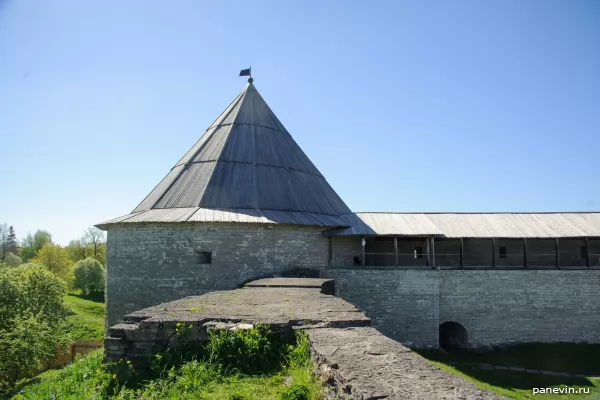
Klimentovskaya Tower - the name of the church located near Clement.
The width at the base is 24.5 meters, the height together with the teeth is 16 meters, the thickness of the walls at the foundation is almost 9 meters. This tower had 14 loopholes, which for its period of time was extremely much.
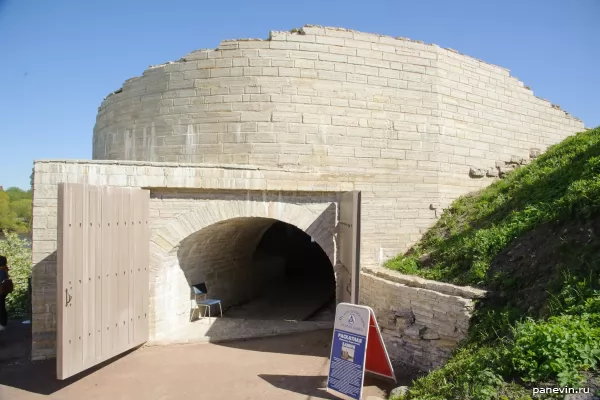
The roll tower, the lower tiers are preserved, the upper ones are recreated on them.
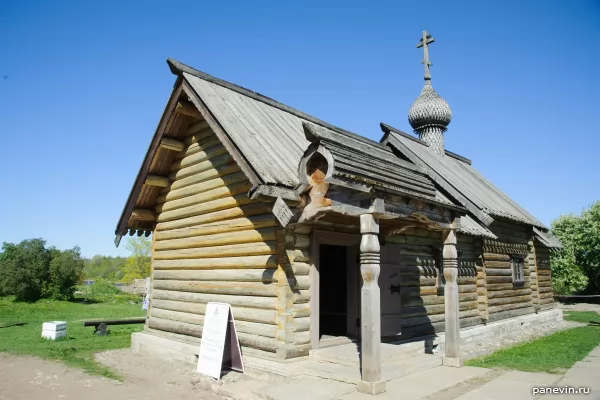
The wooden church of Dmitry Solunsky (XVII century, recreated).
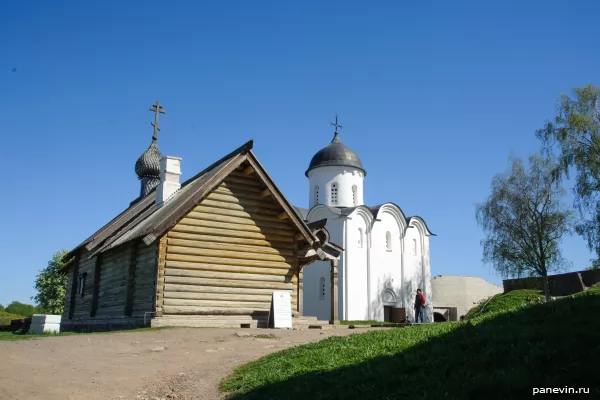
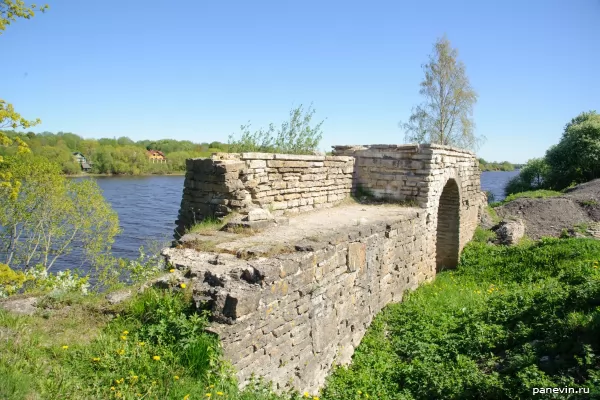
Trading window .
Part of the wall with the “trading window” - supplies from ships standing on the Volkhov were transmitted through this window so that someone else’s eyes would not see the secrets of the fortress.
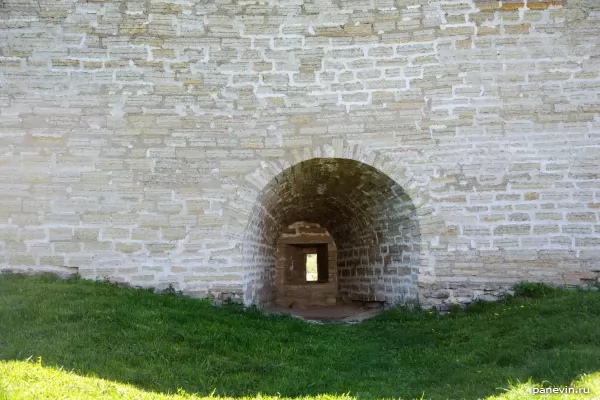
Loophole in the wall.
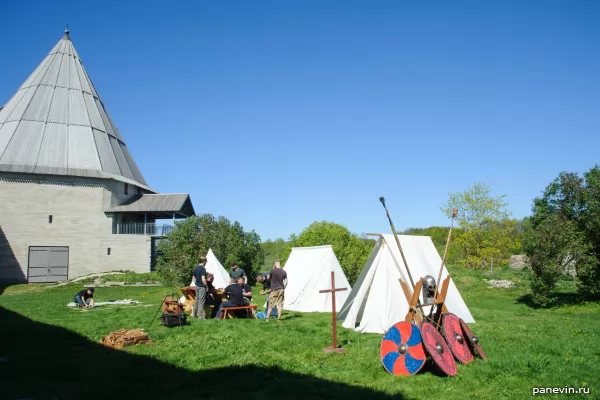
Camp reenactors.
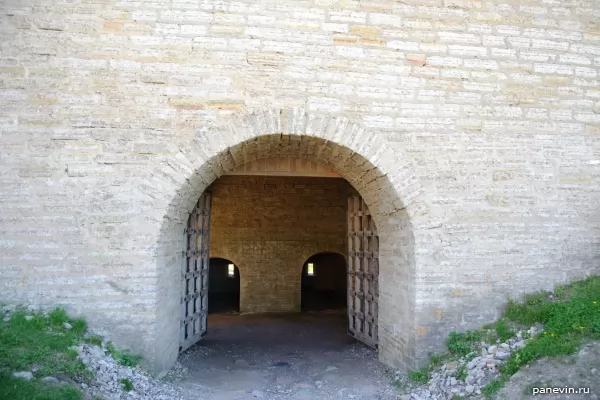
Gate of the fortress, inside view
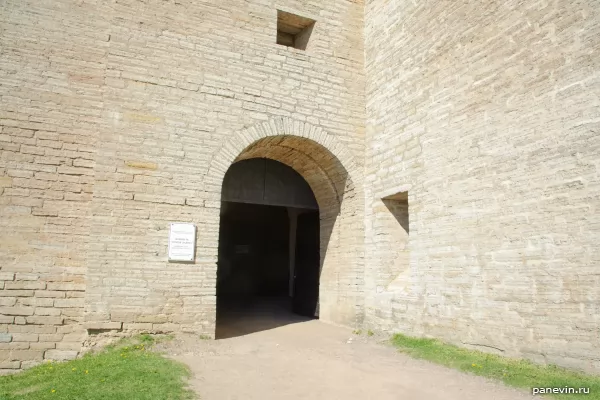
The gate is outside, the passage is not through, but is specially made by the letter G, in order to complicate the assault.
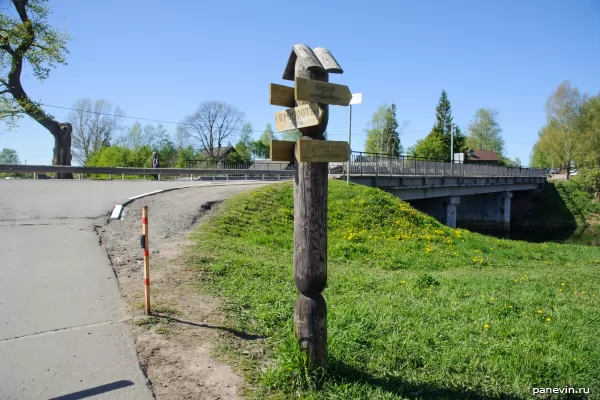
Wooden signs to the nearest sights of Old Ladoga.
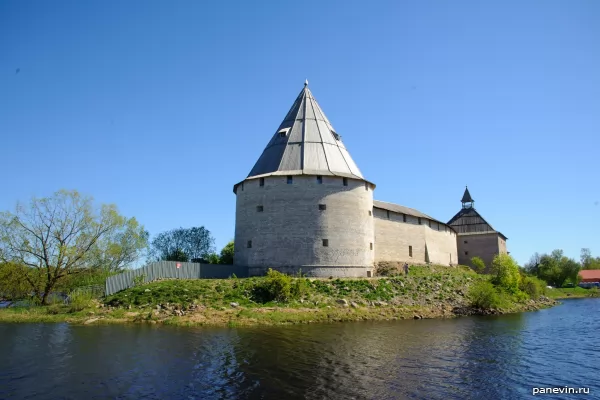
The arrow tower of the Staroladozhsky fortress is on the “arrow”, at the confluence of the Volkhov and Ladozhka rivers.
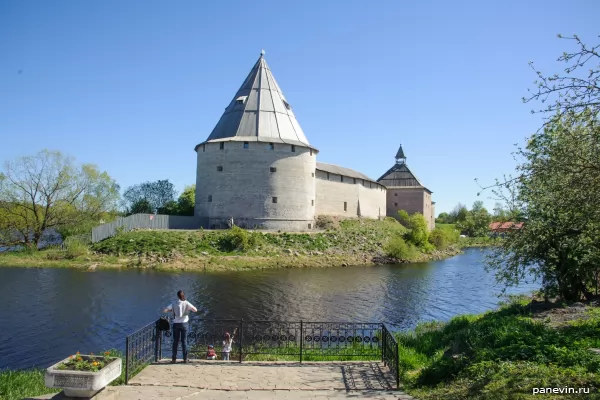
A descent and observation deck is made to the Elena river.
The history of the fortress is extensive, for example, in 997 it was destroyed by the Scandinavian earl Eirik. The fortress was re-erected in 1114 by Paul Mayor under Prince Mstislav. It should be noted that it was the first stone fortress of Ancient Russia. The emergence and spread of firearms in the XIV – XV centuries led to the need for new restructuring of the fortress, 5 towers were erected (Klimentovskaya, Vorotnaya, Taynichnaya, Strelochnaya and Raskatnaya). In 1585, for the first time in Russia, earth bastions were piled up.
During the period of unrest of the 17th century and the Swedish expansion, the fortress passed from hand to hand several times, and only in the Stolbovsky peace of 1617 did it finally cede to Russia and become a frontier outpost.
At the beginning of the Northern War, Peter I increased the garrison of the fortress, but as early as 1702 the capture of the Noteburg moved the border back 100 km. Gradually, in connection with the construction of St. Petersburg, Kronstadt and the capture of Vyborg, the fortress lost its strategic importance and in 1714 the garrison was derived from it.

The fortress of Staraya Ladoga, in the foreground - the Clement's Tower, behind it on the left - the Gate Tower.

The arrow tower (corner) is a three-tiered tower located on the "arrow" - the confluence of the Elena River (Ladoga) and Volkhov.

The switch tower can be climbed and walked along the fortress wall.

Church of St. George (XII century).
According to legend in 1164, Ladoga withstood the siege of the Swedes, and then calling for help Novgorod, Ladoga drove the enemy and at the mouth of the river Voronegi completely defeated him. In honor of this victory, the Church of St. George the Victorious was raised.

View of the Church of St. George from the fortress wall.

Klimentovskaya Tower - the name of the church located near Clement.
The width at the base is 24.5 meters, the height together with the teeth is 16 meters, the thickness of the walls at the foundation is almost 9 meters. This tower had 14 loopholes, which for its period of time was extremely much.

The roll tower, the lower tiers are preserved, the upper ones are recreated on them.

The wooden church of Dmitry Solunsky (XVII century, recreated).


Trading window .
Part of the wall with the “trading window” - supplies from ships standing on the Volkhov were transmitted through this window so that someone else’s eyes would not see the secrets of the fortress.

Loophole in the wall.

Camp reenactors.

Gate of the fortress, inside view

The gate is outside, the passage is not through, but is specially made by the letter G, in order to complicate the assault.

Wooden signs to the nearest sights of Old Ladoga.

The arrow tower of the Staroladozhsky fortress is on the “arrow”, at the confluence of the Volkhov and Ladozhka rivers.

A descent and observation deck is made to the Elena river.
The history of the fortress is extensive, for example, in 997 it was destroyed by the Scandinavian earl Eirik. The fortress was re-erected in 1114 by Paul Mayor under Prince Mstislav. It should be noted that it was the first stone fortress of Ancient Russia. The emergence and spread of firearms in the XIV – XV centuries led to the need for new restructuring of the fortress, 5 towers were erected (Klimentovskaya, Vorotnaya, Taynichnaya, Strelochnaya and Raskatnaya). In 1585, for the first time in Russia, earth bastions were piled up.
During the period of unrest of the 17th century and the Swedish expansion, the fortress passed from hand to hand several times, and only in the Stolbovsky peace of 1617 did it finally cede to Russia and become a frontier outpost.
At the beginning of the Northern War, Peter I increased the garrison of the fortress, but as early as 1702 the capture of the Noteburg moved the border back 100 km. Gradually, in connection with the construction of St. Petersburg, Kronstadt and the capture of Vyborg, the fortress lost its strategic importance and in 1714 the garrison was derived from it.
Share:
Themes: fortification 35 fortresses 25 photos 417 Staraya Ladoga 3 travel 286
Ticket sales through JetRadar.com service without commissions and markups.
← Blog
krepost_staraya_ladoga
blog










